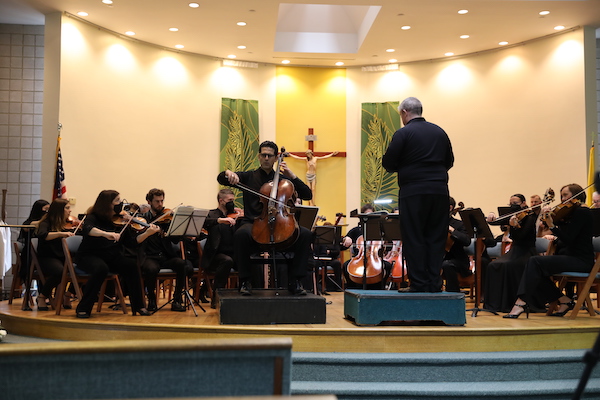Apollo Orchestra returns from lockdown with solemn and joyful music

Amit Peled performed Schumann’s Cello Concerto with the Apollo Orchestra led by Stephen Czarkowski Sunday at the Church of the Resurrection in Burtonsville. Photo: Bruce V. Boyajian
Over two years after the first coronavirus lockdowns, the last few classical music organizations are returning to live performance. Among that group was the Apollo Orchestra, which presented its first concert since March 2020 Sunday afternoon on the Living Art Concert Series at the Church of the Resurrection in Burtonsville. The concert was, like all Apollo events, free and open to the public, thanks to the support of the Downing Family Foundation.
The ensemble was limited to only about forty musicians, consisting of pairs of woodwinds, as well as trumpets and horns, which with timpani and strings more than filled the church’s small altar platform space. Conductor Stephen Czarkowski opened the program with a tribute to the victims of the Russian attack on Ukraine, a heraldic performance of the Ukrainian national anthem.
The chamber-sized instrumentation was precisely what is called for in all the music programmed, including the brief Fate Now Conquers, composed by Carlos Simon in 2020. The composer drew inspiration from a notebook written by Beethoven in 1815, in which a quote from The Iliad includes the words used by Simon as a title. Over a bustling texture of strings and woodwinds, the muted trumpets chattered nervously with the horns.
In a note, Simon likened this musical agitation to the “uncertainty of life.” The piece grew in scope, the brass forming clustered chords that rode over the bumpy orchestra beneath it. After a return to something like the opening section, the piece calmed long enough for principal cellist Marion Baker to wax poetic on a brief solo. In a final drive, Czarkowski led loud syncopated stings in the brass and timpani to create a vivid climax.
The compact orchestra made an ideal balance for Amit Peled’s ardent sound as soloist in Schumann’s Cello Concerto. Peled sang plangently on his highest string in the gentle opening movement, also giving the running passages crisply articulated flow. Peled’s intonation was impressively accurate, the tone brought to life by a robust but clean vibrato. Czarkowski matched this romantic abandon with beefy tutti sections from the orchestra.
In the second movement, linked to the first with no pause, Marion Baker was initially a little reticent on the principal cello solo. A beautiful duet emerged, especially as Peled wrapped his perfectly tuned, sonorous double stops around Baker’s contrapuntal line. Czarkowski carefully negotiated the transition into the finale, again with no break allowed by Schumann.
The orchestra and Peled were not quite together in the opening of the third movement, but they soon reached a consensus. Peled played with remarkable agility, including in the octaves broken over triplets. The oaky sound of his lower strings marked the cadenza, which Schumann accompanied in the orchestra. In the triumphant conclusion Peled’s left hand darted nimbly up to the top of the A string.
Peled offered a timely and moving encore, in the form of a Ukrainian folk song arranged for solo cello by the Ukrainian-born Joachim Stutschewsky. Peled rendered the piece’s soulful melody with expressive phrasing and rhythmic freedom, a tribute to the composer he called his “cello grandfather,” as Stutschewsky fled Europe in 1938 for Palestine, where he taught Peled’s first cello teacher.
The concert ended on a sunnier note with Mendelssohn’s vibrant Fourth Symphony, known as the “Italian” because he sketched out its movements during a tour of Italy. The small complement of violins (seven firsts and six seconds) made an exuberant sound on the first movement’s excited opening theme, led by concertmaster Claudia Chudacoff. Some intonation issues surfaced in the flutes in the second theme, and the smaller numbers of lower strings sounded taxed in the fugal development.
On the other hand, the violas paired beautifully with the bassoons to carry the second movement, inspired by a religious procession in Naples. The flutes, now in a low, breathy register, paired nicely with the violins as well. The third movement felt the least secure, perhaps faster than it really needed to be for a minuet.
Czarkowski and his ensemble also rushed a bit in the fourth movement, but the woodwinds handled the demands capably. Once the tempo had settled into place, the ensemble came together for a grand finish, dancing through the saltarello and tarantella rhythms. Mendelssohn’s unexpected switch to A minor, after three movements in the parallel major, suited the somber music heard earlier on the program.
The Apollo Orchestra joins violinist Cho-Liang Lin and organist Julie Vidrick Evans for music of Laurin, Mozart, and Beethoven 4 p.m. June 19. apolloorchestra.com

Posted May 03, 2022 at 9:22 am by Judith Davidson
I loved the concert, online, especially Peled’s rendering of the Schumann Concerto.